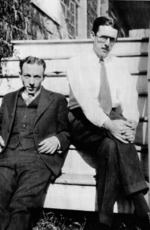
4 min read
We’re fortunate at Reward Gateway to have been inspired and led by some incredible thinkers in employee engagement, company culture, and leadership. Our new series, “Lighting the Spark,” features one of these amazing thinkers every month. This month, we chat about two: E.B. White and William Strunk.
Ever since I was little, I loved to write. I passed out a newsletter in the fourth grade called “My Made Up World” and charged a quarter for it, I wrote an (arguably) epic “novella” in middle school about the tricky pre-teen world of dating and I made my way from there to the more reputable written words of journalism and magazine writing, and eventually, over to marketing.
There are few industries where you won’t find yourself writing on occasion. As the content marketing manager for Reward Gateway, I write probably more than most in the company, but human resources professionals are writers, too.
You might not think that, but as HR professionals, it’s your job to tell the story of the company and keep your employees following it.
So it’s no surprise that my inspiration comes from, well, a pretty darn good writer. “The Elements of Style” was a staple in my freshman year journalism class, and I still thumb through the well-worn copy in my Boston apartment from time to time. It sits next to my Associated Press Stylebook and Ann Handley’s “Everybody Writes.” Not familiar with it? Here’s a good overview, that’s also good for a laugh:
“The Elements of Style” is a short read at a mere 52 pages, but really, it’s something that you’ll find yourself coming back to time and time again. I particularly like the sections on words and expressions commonly misused (if you’ve ever mixed up “affect” and “effect,” I suggest dog-earing the chapter!). The authors, William Strunk Jr. and E.B. White, are a teacher-student pair from Cornell University, a U.S. Ivy League college. Consider the book your guide to some of the more technical issues of writing.
And as writers (no matter what your title really is) it’s important to realize that with every word you write, your audience is taking notes. Your written word is your credibility. What does that mean?
Eliminate typos. Double check your work. Limit the jargon — think about your audience, and who you’re speaking to. Would new employees understand your benefits announcement the same way longer-serving employees would? Make sure your content speaks to all, not some. (And if you do need to segment, we have a few tips on that, too.)
Compel, don’t sell. In today’s world, people know when they’re being sold something, and the same goes for your employees. Don’t sugarcoat an important company update that impacts dozens by skating over the facts. Be open and transparent with your people, and they’ll support your decisions that much more.
Choose your words carefully. Think about the emotion behind your update, announcement or story that you’re trying to convey. Your overall tone is critical, whether it’s a feel-good benefit or perk, or an urgent update that your employees must take action on. Put your most important information first, so it’s more likely to be read. Remember, your employees are likely to be busy (and the average attention span is eight seconds), so keep it short and sweet. If you can say it in fewer words, do so. Always double check your work, and try to cut it in half (without missing your main points). Well, E.B. Strunk and White (these men, below) say it best:
“Vigorous writing is concise. A sentence should contain no unnecessary words, a paragraph no unnecessary sentences, for the same reason that a drawing should have no unnecessary lines and a machine no unnecessary parts. This requires not that the writer make all his sentences short, or that he avoid all detail and treat his subjects only in outline, but that he make every word tell.
— "Elementary Principles of Composition," The Elements of Style
If you’re not used to writing, try to challenge yourself. Take a notebook with you on your morning commute on the train or bus and jot down what you see, what’s on your mind. Scribbling in a notebook counts, I promise. Write something. Write anything. But above all: Write well.
 Chloe Thompson
Chloe Thompson




